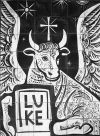
The Gospel of Luke
The Pharisee and the Tax Collector: Lk 18,9-14
As we noted previously, this parable is marked off from the earlier parable by the conclusion in 18,8 and the change of audience in 18,9,
The introduction in verse 9 makes it clear that this parable is about attitudes rather than prayer even though there is also important teaching about prayer as well.
These attitudes are: trusting in themselves, self righteousness and better than others.
The Temple was the place where the Jews gathered before God and so a place of prayer as in the two references.
For Pharisees, I mentioned the banquet of chapter 14 and the reference to lovers of money in 16,14. For tax collectors, I mentioned the preaching of John the Baptist, Levi and Zacchaeus. While this gives a broad background to our expectations in reading this parable, we need to read these two men in terms of the parable.
What the Pharisee gets right is the need to thank God. What he thanks God for is true but at the same time horribly wrong. Without realising it, he has become self-righteous rather than righteous. He could indeed be trusting in himself rather than God. He is better than others, such as the tax collector whose presence he recognises. All as in verse 9.
The attitude of the tax collector was so different. The Gospels give us two named examples of tax collectors with Levi (5,27) and Zacchaeus (19,2). He admits to being the sinner the Pharisee thinks he is. So he stands well away, with eyes lowered and beating his breast crying out to God for mercy. He recognises his need and dependence on God.
While the lesson on attitudes may be primary, the lesson on prayer also important.
Our need for God's mercy is fundamental as is our recognition of that need. Thus in various forms, the prayer of the tax collector became one of the most important prayers of the Church: God be merciful to me, a sinner.
Jesus' comment in verse 14 repeats the comment he made earlier when eating with the Pharisees (14,11).
And so the tax collector was right with God because he knew his needs and was open to receiving them from God. The Pharisee on the contrary was locked into his own world.
We can now return to the main page.
The Sunday Gospel
The heading to the reading from Ecclesiasticus makes the point from the reading: the prayer of the humble shall pierce the clouds.
We can now return to the main page.
